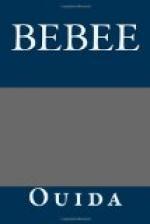Leaning against the little lattice and looking down on her with musing eyes, half smiling, half serious, half amorous, half sad, Bebee looked up with a sudden and delicious terror that ran through her as the charm of the snake’s gaze runs through the bewildered bird.
“Would you cease to wish it if it were not good?” he asked again.
Bebee’s face grew pale and troubled. She left her hand in his because she did not think any shame of his taking it. But the question suddenly flung the perplexity and darkness of doubt into the clearness of her pure child’s conscience. All her ways had been straight and sunlit before her.
She had never had a divided duty.
The religion and the pleasure of her simple little life had always gone hand-in-hand, greeting one another, and never for an instant in conflict. In any hesitation of her own she had always gone to Father Francis, and he had disentangled the web for her and made all plain.
But here was a difficulty in which she could never go to Father Francis.
Right and wrong, duty and desire, were for the first time arrayed before her in their ghastly and unending warfare.
It frightened her with a certain breathless sense of peril—the peril of a time when in lieu of that gentle Mother of Roses whom she kneeled to among the flowers, she would only see a dusky shadow looming between her and the beauty of life and the light of the sun.
What he said was quite vague to her. She attached no definite danger to his words. She only thought—to see him was so great a joy—if Mary forbade it, would she not take it if she could notwithstanding, always, always, always?
He kept her hand in his, and watched with contentment the changing play of the shade and sorrow, the fear and fascination, on her face.
“You do not know, Bebee?” he said at length, knowing well himself; so much better than ever she knew. “Well, dear, that is not flattering to me. But it is natural. The good Virgin of course gives you all you have, food, and clothes, and your garden, and your pretty plump chickens; and I am only a stranger. You could not offend her for me; that is not likely.”
The child was cut to the heart by the sadness and humility of words of whose studied artifice she had no suspicion.
She thought that she seemed to him ungrateful and selfish, and yet all the mooring-ropes that held her little boat of life to the harbor of its simple religion seemed cut away, and she seemed drifting helpless and rudderless upon an unknown sea.
“I never did do wrong—that I know,” she said, timidly, and lifted her eyes to his with an unconscious appeal in them.
“But—I do not see why it should be wrong to speak with you. You are good, and you lend me beautiful things out of other men’s minds that will make me less ignorant: Our Lady could not be angry with that—she must like it.”




